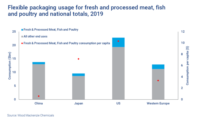Flexible packaging systems offer new, convenient solutions




The latest form/fill/seal (FFS) packaging systems are designed to accommodate a wide range of packaging options at high speeds while ensuring food safety via sanitary design. The systems combine flexibility and automation, as they often need to pack different products on the same line. In addition, new designs enable quick changeover.
These innovations help meet the needs of snack producers and bakeries seeking FFS solutions that ramp up speed, improve cleanliness and enhance efficiency for greater volume and variety. These producers need to be flexible in their ability to package different products and packages to meet short-term demand swings and market promotions.
Retailers want packaging formats that bring more convenience to their customers. They also want smaller packages for snack-size portions, along with new film technologies that allow for easy reclosure. Single-serve and resealable packages are in high demand.
Modern-day equipment
Today’s FFS equipment must be able to handle gusseted, block-bottom, canoe pack and quattro seal formats on the same line, and easily switch from one to another, according to Mark Lozano, sales manager, North America, tna, Dallas. The more flexible the packaging system, the less time is required to change production runs to accommodate different pack sizes or formats. “This means no mechanical adjustments when changing product or film, quick former changes and a wide variety of jaw size configurations that enable flexibility of bag size and format, film type and application on a single packaging system.”
Among FFS innovations recently introduced to the market, Triangle Package Machinery Co., Chicago, has unveiled the Model XYRJ vertical FFS bagger. It features a rotatable sealing jaw that allows packagers to run a variety of bag styles, including pillow, three-sided seal, gusseted, stand-up pouch, flat-bottom bags and zippered bags.
“The design of the jaw allows for changeover in a few minutes. “One of the key benefits offered by the Model XYRJ is that it not only meets customers’ current packaging demands, but it has the capability to produce additional bag styles in the future as their needs change,” says Kim Magon-Haller, marketing manager, Triangle Package Machinery.
The Model XYRJ can produce over 70 zippered pouches per minute. “This speed is possible because Triangle has developed a constant-motion zipper application system. The zipper and film move continuously during machine operation, while film registration and zipper feed are controlled by a programmable logic controller (PLC). Most settings for sealing different pouch sizes are stored in a PLC recipe, making changeover between sizes easy and consistent,” Magon-Haller adds.
Reiser, Canton, MA, has added Variovac horizontal FFS machines to its equipment line, which includes the compact Optimus and the larger Primus. Both feature Variovac’s RAPIDAIRSYSTEM for high-speed forming and sealing. “For semi-rigid and flexible film applications, this system provides precise forming of the bottom web without the need to pre-heat the film; this allows for faster production speeds while freeing up space in the loading area,” says Alistair Thomson, packaging specialist.
A four-point lifting station further improves the forming and sealing of packages. “Also, the Reiser Optimus comes with a multi-language, programmable touchscreen that includes diagnostic software for easy operation. Reiser FFS machines also produce modified-atmosphere and vacuum packages from flexible and semi-rigid materials,” Thomson notes.
WeighPack, Montreal, part of the Paxiom Group, has introduced the VerTek line of vertical FFS machines, which can form pillow pouches from 2 to 24 inches wide and 3 to 36 inches long. “In today’s retail landscape, bakery/snack producers are requesting speed, flexibility and ease of use in one system. The VerTek’s simple design, recipe storage and easy changeover align with the needs of this market,” says Nicholas Taraborelli, vice president, sales and marketing.
Bosch Packaging Technology, New Richmond, WI, introduced a number of FFS solutions at PACK EXPO 2017. Two in particular are relevant to bakery/snack producers. The first applies to confectionery, bakery products and nuts. It consists of the Yamato multi-head weigher ADW-O-0314S and Bosch SVE 3220 DZ vertical FFS machine. The bagger offers seven popular bag styles, including larger Doy Zip formats. Color-coded components facilitate easy changeover, which minimizes operator error.
The second is the horizontal Biscuit on Pile packaging system, which comprises a magazine feeder, horizontal flow wrapper and integrated top-load cartoner. The Smart Pile Loader is a magazine feeder designed for gentle product handling and continuous flow. “By automatically extracting a variable number of cookies from each magazine, the feeder can compensate when product supply from the oven to the packaging system fluctuates; it also supports automatic lane balancing,” says Andreas Schildknecht, product manager, Bosch.
Formost Fuji Corp., Woodinville, WA, has introduced the Alpha 8 horizontal FFS wrapper, which features a short film route for reduced waste during setup and stainless steel film rollers for improved hygiene. The center fin seal unit can tilt down without tools, providing easy access for sanitation and maintenance. Also, the Fuji Vision System features automatic detection of film registration, allowing for easy setup and product changeover.
tna offers the tna robag series of packaging systems, which can reach speeds of 250 bags per minute. The company recently developed an all-in-one tna robag packaging system with a fully integrated inserter and labeler. “Our engineers achieved a full hardware and software integration of this equipment into a high-speed vertical FFS packaging system,” Lozano says. “This capability expands the possibilities of adding extra value to food products. This may encompass including promotional items such as coupons or small collectibles into packaging or inserting small sacks of sauces or extra seasoning to provide an extra flavor boost.”
The Butler splicer from Butler Automatic Inc., Middleborough, MA, adds 10 to 15 percent additional output to a typical vertical or horizontal FFS machine by eliminating roll-change downtime, according to Chip Johns, president. The splicer holds two rolls of film. When the running roll empties, a new roll is automatically spliced onto the end of the running roll, providing non-stop roll changeover.
Butler has introduced two features to further improve production speed and changeover time: an improved mini dancer that allows large variations in intermittent motion to accommodate the faster speeds of horizontal FFS lines, and an integrated register splice sensor that allows for changeover in bag sizes to be pre-programmed, thus reducing changeover time.
Time for improvements
All FFS equipment needs to accommodate new food safety regulations. To that end, sanitary design had been the focus of improvements.
For example, VerTek baggers from WeighPack are finished in 304 stainless steel and include an open, hygienic design to ensure that mechanical components do not come in contact with food. There are no small crevices for product to gather or bacteria to hide, thus eliminating the potential risk of contamination.
The X-Series vertical FFS baggers from Triangle are sanitary by design, says Magon-Haller. “All product contact points are made from stainless steel, then electropolished to create a smooth surface that prohibits product buildup. In addition, the majority of standard assemblies within the frames—film cage, forming tube uprights and top plate—are stainless steel.”
Kollmorgen, Radford, VA, recently introduced the IP69K stainless steel servo motor for wet washdown areas. The motor can be cleaned like the rest of the machine, foamed and sprayed with high-pressure water. This eliminates the need for guards that make FFS machines larger and more complicated, according to Bill Sutton, business development manager.
“When standard or food-grade servo motors are used in washdown environments, they often fail due to detergent and water ingress, causing machine downtime,” Sutton notes. “The hygienic design of the servo motor also helps in dry-cleaning areas. The design leaves product, and the pathogens that follow, no place to hide.”
In the near future, FFS technology will become more flexible and versatile in terms of what is capable within a single system. “Customers will continue to drive us to supply equipment that allows for the greatest flexibility while minimizing the footprint within a plant,” Thomson predicts.
More human-machine interface (HMI) is on the horizon, as well. “In recent years, the industry has started to move towards Industry 4.0 and complete systems,” Schildknecht says. “As a gateway to Industry 4.0, Bosch’s new cookie and cracker packaging systems are equipped with HMI 4.0 touchscreens, which guide the operator through each step of the production process. The clearly structured menus give operators an overview of machine status and provide step-by-step instructions for everyday operations using pictures and videos.”
After all, with more information—and easier systems to operate—operators increase their chances of error-free success every day on the production floor.
This article was originally posted on www.snackandbakery.com.
Looking for a reprint of this article?
From high-res PDFs to custom plaques, order your copy today!







